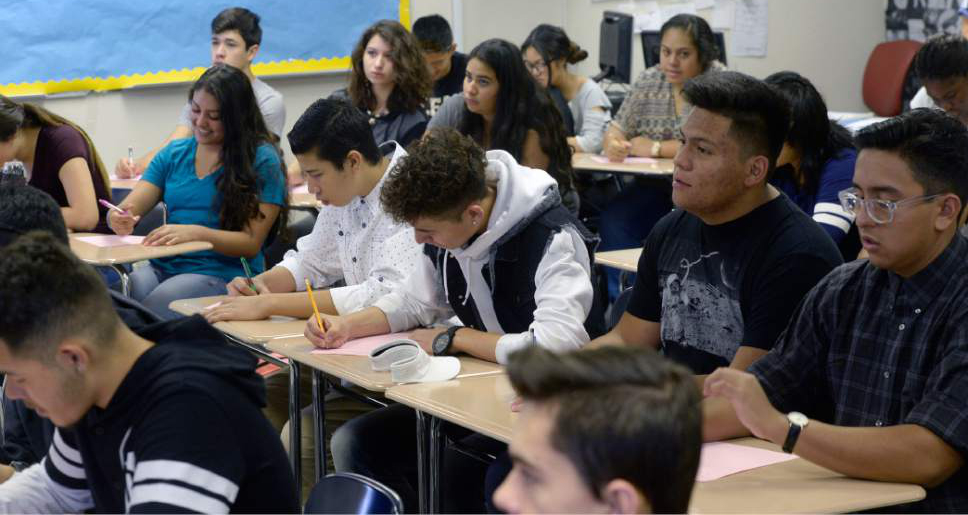This is an archived article that was published on sltrib.com in 2017, and information in the article may be outdated. It is provided only for personal research purposes and may not be reprinted.
[Video: Provided by folks at Our Schools Now]
He was the very model of a college English professor. Corduroy jacket with patches on the elbows. Round glasses. A full beard. Steaming cup of coffee in one hand. Smoldering cigarette in the other. (Which gives you an idea of how long ago this was.)
And he had our number.
The first day of the first semester. English 101H. H for honors. A small class, maybe 30 of us, with a full Ph.D. professor. No overcrowded lecture halls with teaching assistants for us. Oh, no.
He somehow appeared to fix his gaze on every one of us at once and say, before he said anything else, "You don't fool me."
Stunned silence from a room full of freshmen.
"This is an honors class. That means the university thinks you are the smart kids. But I know better."
More silence.
"Every one of you did really well on some kind of test in the second grade. And you've been coasting ever since. That's over."
Busted, we spent the next two or three weeks going over grammar, the parts of speech, punctuation, diagramming sentences. Which most of us had actually done in junior high, but the refresher was useful. As was the mutual understanding quickly reached that being the sort of student who was good at taking tests, or bluffing his or her way through a writing assignment, would get you promoted from grade to grade, but was not necessarily the same thing as being smart, or well-educated.
It is difficult to imagine a silence, stunned or otherwise, falling over the members of the Utah Legislature. But somebody has to tell them that Utah's system of public education has been coasting on past glories for many years.
For generations, Utah prided itself on its success educating its children for a relatively low cost to the taxpayers. Last in per-pupil expenditures was the wonkish way of putting it. "Stack 'em deep and teach 'em cheap," was the unofficial motto.
Despite the relatively low amount of money spent, Utah's results seemed acceptable at the least. But that was because the student population of the state was overwhelmingly the product of white, two-parent, well-educated, extended-family-supported, English-speaking, middle- to upper-class households. Books in the house. Breakfast before school. Mom at home. Three channels. No cell phones.
That's over. And has been for a long time.
Now Utah public schools are charged with educating refugees and other non-English speakers, the homeless, children with autism and other handicaps, children whose parents abuse them and children whose parents love them more than life and so are working three jobs to try to support them.
And to do so with revenue sources that have been diverted, trimmed and manipulated by a taxophobic Legislature so that income for this most basic public function has been $1.2 billion a year below what it would otherwise have been. Graduation rates have been inching up. But test scores are, with a couple of exceptions, decidedly mediocre.
A group that includes some of the state's most successful folks – and so, by capitalist measure, must also be the state's smartest people — has assembled under the name of Our Schools Now to campaign for a small hike in the state's basically flat income tax rate to make up some of that lost ability.
They are up against a legislative leadership that automatically assumes that the same entrepreneurial class that makes up the Our Schools Now steering committee will high-tail it out of any jurisdiction that even thinks about raising even a paltry income tax rate. Legislative leaders who the other day were trying to divert energy and attention by making desperate noises about appointing a task force to study the problem.
The Our Schools Now folks — bank presidents, utility executives, owners of our professional sports franchises — can only wonder who the business leaders and blue ribbon committee members the lawmakers are talking about might be, if not them.
And they ask why, if the Utah business-friendly climate lawmakers brag about is so great, most of the jobs created in the state are call center, service and other low-paying jobs and not the high-tech, start-up, build-your-own future enterprises that are sprouting up in states where the taxes assessed are much higher, and where the public services provided are much better.
Of course, like my old English professor, they know full well why. The way Utah pays for its schools has been coasting for a long, long time. Time for that to be over.
George Pyle, a Tribune editorial writer, has never started a business. But he can diagram sentences with the best of them.



